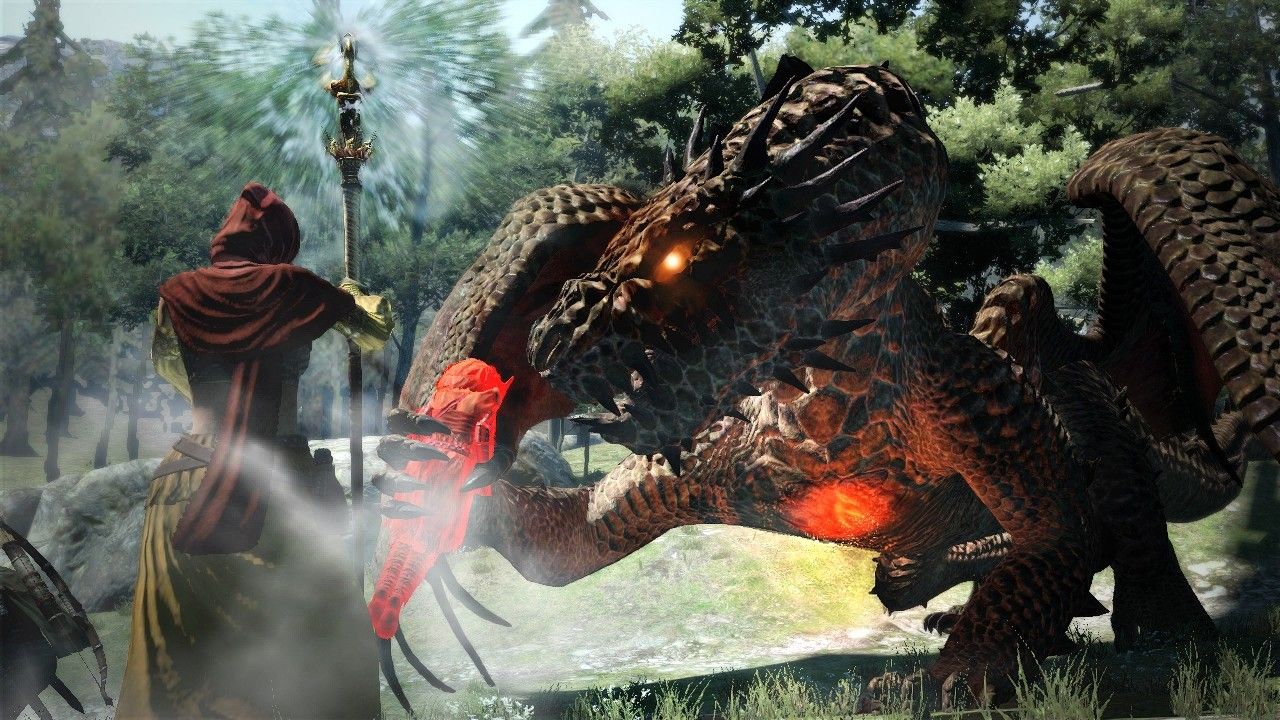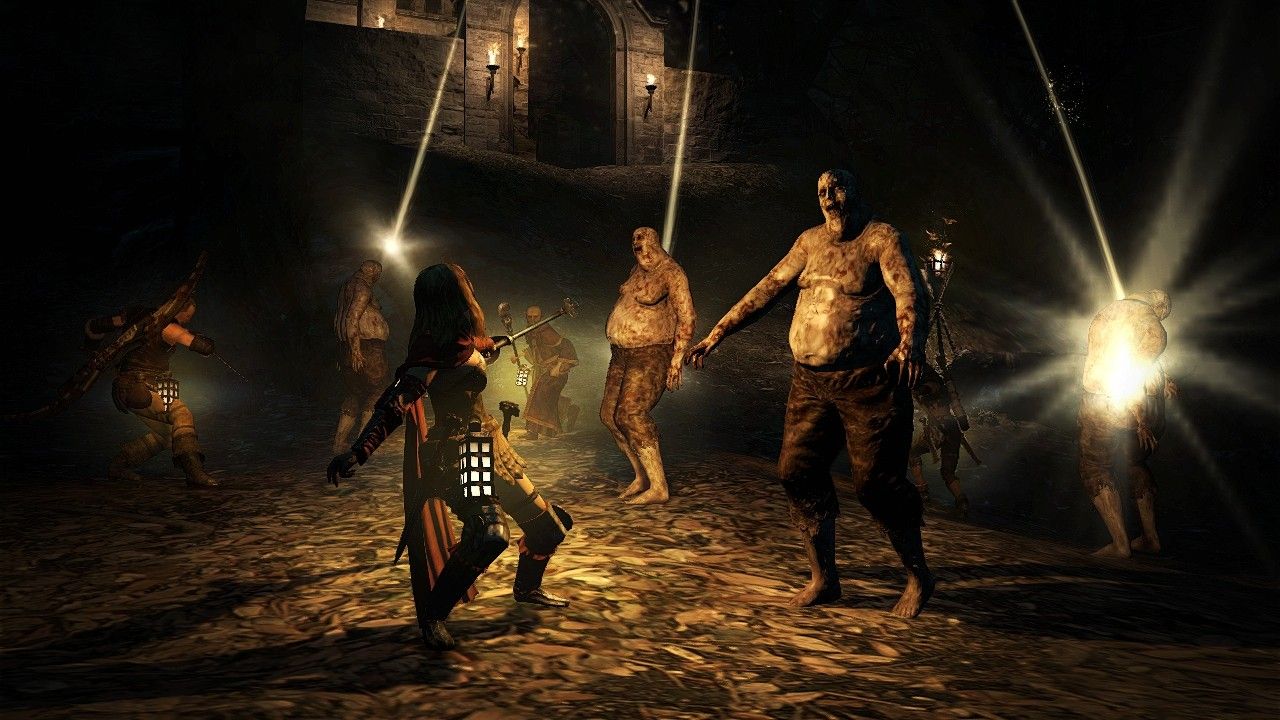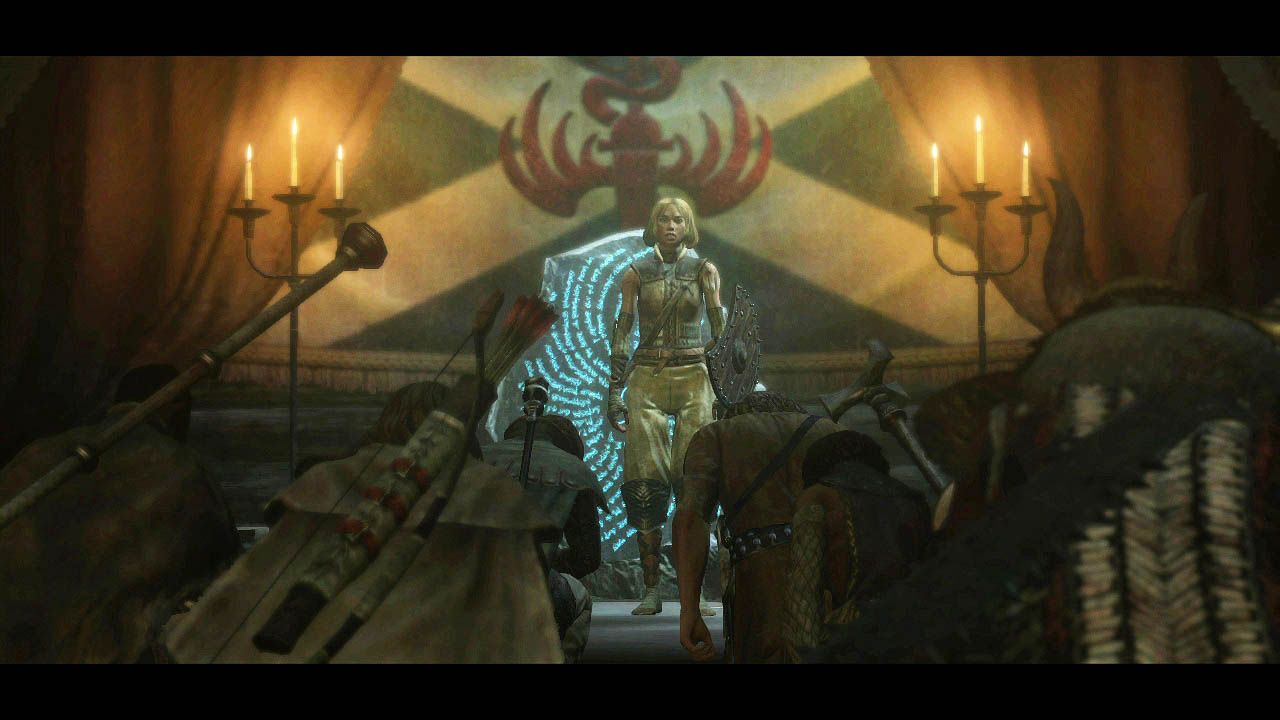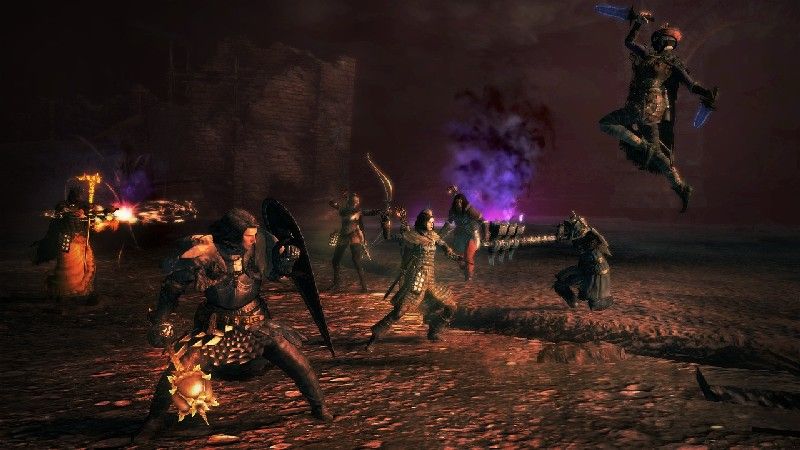Dragon’s Dogma Review
Posted by
FeverDog
on
Say what you will about Capcom, but their new RPG, Dragon’s Dogma, is a brave game. Releasing a no-holds-barred RPG without brand recognition or a hype-steamroller behind it is a gutsy task. In fact, many aspects of Dragon’s Dogma are laudable, and even enjoyable, but in the end, it’s easier to admire Dragon’s Dogma than to enjoy it.
The story is fairly-standard fantasy fare, minor interesting details of appearance and development being buried under casually overdone clichés. In the beginning, after a short tutorial introduction, the main character’s village is attacked by a dragon, and the player avatar has his heart torn out by said dragon who then issues a challenge for the player to rise and slay him. After a slightly edgy twist in its opening presentation, the idea of the main character ostensibly being dead or at least not totally human, it becomes clear that exploring this aspect of the character or the world’s reaction to it is no priority. In that way, it becomes the same turn on pre-destination that most contemporary RPGs take. Compare Skyrim’s Dragonborn and Amalur’s dead protagonist.

Putting an even greater strain on the story, however, is Dragon’s Dogma’s lack of focus. While it’s an obstacle that many games before have struggled with, but rose to greatness despite a progression-based setback, Dragon’s Dogma attempts focus and fails too greatly to be unnoticeable. While side-quests are abundant and the world is large and free, even the main story quests all too often forget the end goal, and on the rare occasion, it can even be difficult to determine which, out of a mix of quests offered, will advance players through the main plot.
While Dragon’s Dogma’s structure appears, at first glance, to be loose and exploration based, it only meets the goal halfway through. Enemies in the overworld don’t level to the player’s experience or power. This is an exercise in hands-free gameplay, one where the game allows you to move wherever you like and isn’t too fussy about what quests you take and where. The problem this entails, however, is that by being totally hands free, but still utilizing RPG elements, the game is more restrictive as a result. Say it any which way you like, but a game that allows you to move in any direction, then punishes you for moving in a certain direction, may be unintentionally punishing you, but it’s still punishing you. All of a sudden, it becomes safer and more involving treading the beaten path, and the game begins to feel linear as a result.

A unique feature, however, is the ‘Pawn’ system. The player is expected to craft another unique player, using the same character creator with the same set of sliders and switches to make a new NPC called a pawn. Pawns act as confidantes and helpers, while in the context of the story, being creatures without free will, unable to function on their own or without leadership. The mechanic would seem fairly commonplace were it not for the way it’s integrated into Dragon’s Dogma’s unique take on multiplayer. For some added muscle, the player can hire other pawns onto their party, but each pawn is the main confidante for another player online.
At the end of the day, you give the pawn a small assessment, a trinket or trophy, and send him on his way. Should your pawn get picked up, he will bring back his trophy or trinket for you. It’s a unique and interesting system, and certainly a concept that games could play around with for small doses of added innovation, but in the end, it doesn’t add much to the experience other than a pool of mercenaries that happened to be randomly generated and sparse interaction with online players. That said, the game does not lose anything in the experience as a result. It’s a good addition, just not enough to carry or ‘redeem’ other aspects of the game.

The gameplay, minute to minute, however is a huge highlight. Presenting itself in the same dull, warm shades and tones of sunlight glinting off a stone mountain at high noon, one could be forgiven for expecting a somber, reserved experience from Dragon’s Dogma. These people would be very wrong, however, due to a presentation that’s one-part J-rock metal opening cinematic and two-parts Devil May Cry flavored combat.
It’s been compared to a mix of Devil May Cry and Shadow of the Colossus due to its baddie-climbing mechanic, but this is one element that does not come into play nearly enough to be compared against Team Ico’s opus. With combos, parries, special attacks, flaming swords, Zero to sixty sprint functions and a general hot-blooded pace, the combat is fluid, well executed and often helping itself to giant handfuls of cathartic, cherry-flavored schadenfreude. The game pulls a bit of a ‘Metroid Prime’ by starting the player off as a high leveled fighter with lots of neat attacks and armor, then takes it away as the player begins the ‘real game’, but the combat, even without all of the diversity and color of the opening sequence is still a blast, and it doesn’t take too long to start picking out sets of attacks and lining up enemies for beatings in violently vibrant ways.

If there was a downside to this, it might be the fact that the rest of the game feels stale in comparison. While games like Dark Souls and Elder Scrolls have managed to take the act of walking down a dusty mountainside, watching (or experiencing) a character licking their wounds, fabled treasure in hand and introspectively reaping the rewards or anticipating the coming adventure to artful and well paced degrees, Dragon’s Dogma doesn’t quite pull it off. Whether it’s in comparison to its bombastic, third-degree fiery combat, or just the fact that the game doesn’t have the scenery or effervescent world to rely on to make exploration and the game’s quieter moments worth the time they require, it simply doesn’t gel. The first minute after an intense boss fight will leave your fingers twitching, aching for more, but the second or fifth minutes afterward will make you wish the game could spare you the trouble and add a fast-forward button.
On a related note, the game’s presentation is sorely lacking. While the game is not graphically advanced, the polygon counts are low and the textures of people can often seem greasy or plastic, the low graphical quality is not usually an issue, though expect your immersion to sprout a few split hairs during dialog, when you’re forced to stare into the dead eyes of a robotic, stale-faced NPC.
The real issue in the game’s presentation, besides a delightfully Jim Henson-esque dragon, is its own straight-faced fantasy nature, never stepping outside the boundaries of its own setting. This would be no problem, were the game more immersive or involving. The problem lies with the fact that Dragon’s Dogma wants to be a blood-pumping motorcycle crash of a game, and the brown, dull gray mountains and uniformly gray castles of faux-Western Europe don’t cut it. While the excessive bloom of the current generation is annoying, it’s at least vibrant, but Dragon’s Dogma lacks any polish or eye catching moments to call its own.

All in all, Dragon’s Dogma is a game of good ideas in bad places. The slight-multiplayer aspect is interesting and occasionally brings the ally-system a little closer to home in value, but not enough is done with the idea to liven up the system as anything but a constantly updating list of available helpers. The combat is fun and intense, but Dragon’s Dogma doesn’t know what to do with it overall. The system works as a puzzle piece, colorful and interesting, but belonging to an altogether different puzzle. Aspects of the game trying to reach rock-metal, insane and intense levels are forced down by sullen and overused fantasy tropes.
Keep your eyes out for a sequel, if it ever wants to fix itself up and become a more conducive and entertaining experience, it would surely be gold amongst copper, but for the time being, Dragon’s Dogma is a lackluster experience, not bad enough to throw away, but not good enough to see to its conclusion.
